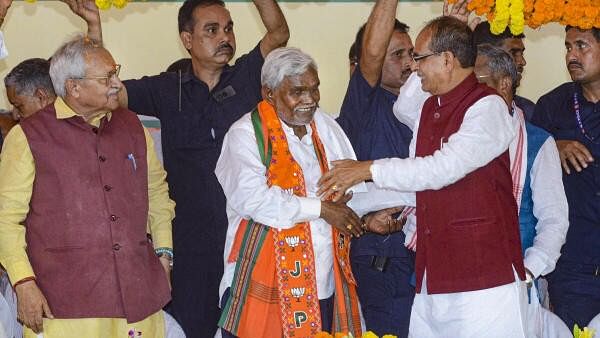
Former Jharkhand chief minister Champai Soren being felicitated by Union Minister Shivraj Singh Chouhan, Jharkhand BJP President Babulal Marandi and others as Soren joined BJP during a ceremony, in Ranchi
Credit: PTI Photo
Ahead of the upcoming Assembly polls, Jharkhand’s political landscape is witnessing significant upheaval. The defection of former chief minister Champai Soren from the ruling Jharkhand Mukti Morcha (JMM) to the Bharatiya Janata Party (BJP) has caught many political watchers by surprise. It has also added a new dimension to the pre-poll strategies of the major political parties in the state.
A seven-time MLA, Soren was a key figure in the JMM, having played a crucial role in the party’s rise in Jharkhand’s tribal heartland. His stature is evident from his sobriquet ‘Kolhan Tiger’, highlighting his dominance in Jharkhand’s Kolhan region, which includes the JMM strongholds of East Singhbhum and West Singhbhum. Both districts have a significant tribal population.
Viewed against the backdrop of Jharkhand’s tribal politics, the significance of Soren’s defection becomes even more pronounced. Tribals make up ~26 per cent of the state’s population, and their support is crucial for any political party aiming to win the polls. The BJP has struggled to gain a foothold among Jharkhand’s tribal electorate. In the 2019 Assembly polls, for instance, the BJP performed poorly in tribal-dominated constituencies, losing a significant portion of the vote to the JMM and its allies. This electoral setback highlighted the party’s inability to connect with tribal voters, a demographic that has historically leaned towards the JMM due to its deep-rooted association with tribal issues and leadership.
However, with Soren now on board, the BJP hopes to turn the tide in its favour. His grassroot connections and reputation as a leader who champions tribal causes may help the BJP overcome the perception that it is out of touch with Jharkhand’s indigenous communities. In a state where regional alliances and tribal affiliations play a significant role, Soren’s defection could give the BJP a much-needed boost.
The BJP’s strategy appears to be twofold. First, to consolidate tribal votes by bringing in influential leaders like Champai Soren. Second, to forge new alliances and strengthen existing ones with regional parties. The BJP’s alliance with the Sudesh Mahto-led All Jharkhand Students Union (AJSU) is significant given the latter’s strong presence in Jharkhand’s rural and tribal regions. In the 2019 assembly elections, the AJSU won two seats, but its influence extends beyond electoral victories. The party represents an important political force, especially in tribal areas where its stance on local issues resonates with voters.
With Soren’s defection and the AJSU alliance in place, the BJP is positioning itself as a formidable challenger to the JMM-Congress-Rashtriya Janata Dal alliance that currently governs the state. This realignment of political forces could disrupt the existing balance of power, where the JMM has historically dominated tribal regions. The BJP’s ability to attract disenchanted tribal leaders and smaller parties into its fold could significantly broaden its appeal and improve its chances in what promises to be a highly competitive election.
Soren’s defection raises questions about the internal dynamics within the JMM. His departure, along with other leaders, may indicate growing dissatisfaction with the party’s leadership, particularly under Chief Minister Hemant Soren. Champai Soren himself publicly voiced his grievances about being sidelined within the party, particularly during Hemant Soren’s tenure as chief minister.
The BJP hopes to capitalise on Champai Soren’s influence to present itself as a party that can provide stability and development. The BJP has been critical of the JMM-Congress-RJD government, accusing it of mismanaging resources and failing to deliver on key issues like development, tribal welfare, and infrastructure. The BJP is positioning itself as a credible alternative.
However, Champai Soren’s defection also poses challenges for the BJP. Integrating a high-profile leader like him into the party’s structure without alienating its existing tribal leaders (like former chief ministers Babulal Marandi and Arjun Munda) will require careful management. Tensions could arise when it comes to ticket distribution and the party leadership will need to factor in this. Balancing these internal dynamics will be critical for the BJP.
Champai Soren’s defection will not only boost the BJP’s chances in the upcoming polls, but it will also pose a significant challenge to the ruling JMM. Whether Champai Soren’s move will pay off for the BJP remains to be seen, but it has undoubtedly reshaped the contours of Jharkhand’s political battlefield.
Sayantan Ghosh teaches journalism at St Xavier's College (Autonomous), Kolkata.
(Disclaimer: The views expressed above are the author's own. They do not necessarily reflect the views of DH.)